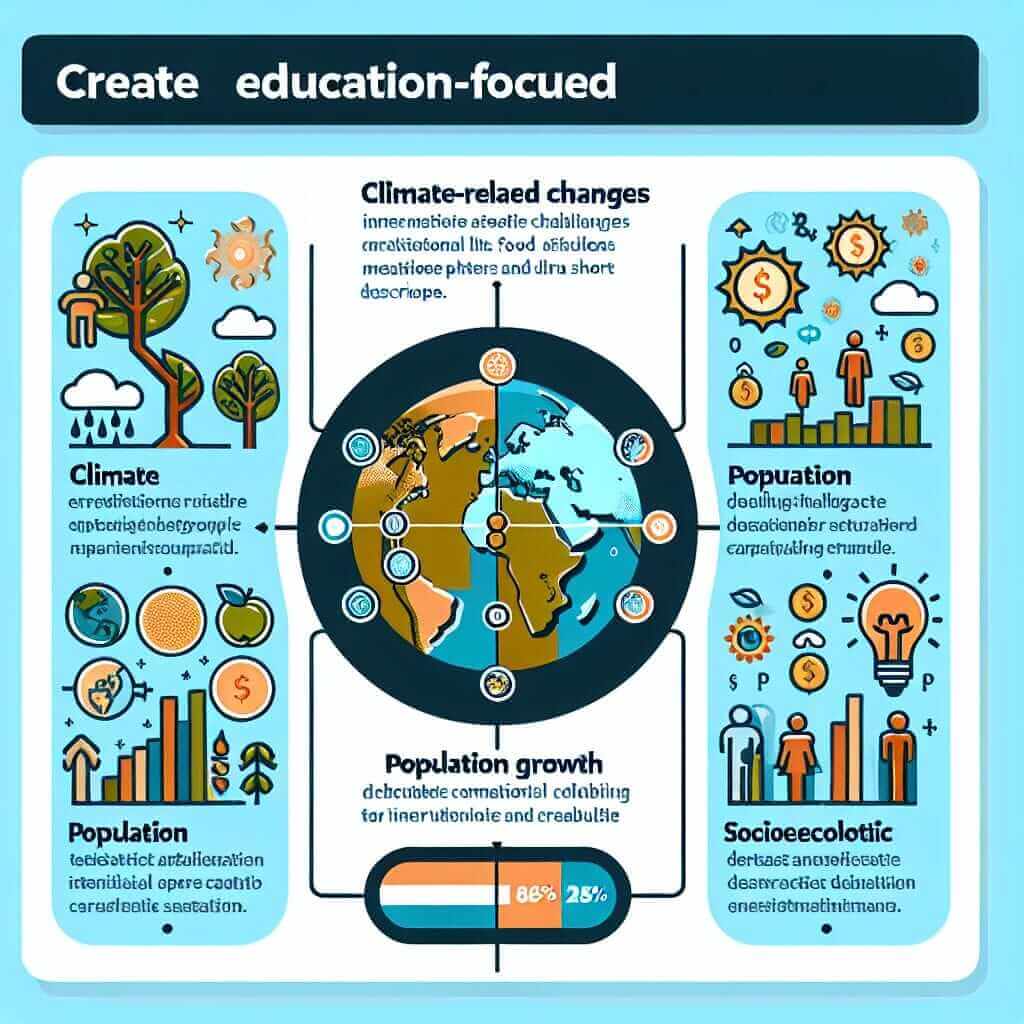In the context of the IELTS Reading exam, understanding global issues such as food security is crucial. The topic “What are the challenges of global food security in the 21st century?” is especially relevant, considering ongoing global conversations about climate change, population growth, and resource management. This article provides a high-quality practice reading passage with relevant questions and answers, aimed at helping you practice effectively for the IELTS Reading test.
The topic of food security has frequently appeared in past IELTS exams, demonstrating its importance and relevance. Therefore, familiarizing yourself with this subject can not only aid your comprehension skills but also prepare you for similar themes that may arise in future tests.
Practice Reading Passage
The Challenges of Global Food Security in the 21st Century
Ensuring global food security in the 21st century presents numerous challenges. These challenges stem from various factors, including climate change, population growth, and socioeconomic disparities.
Climate change is arguably one of the primary threats to global food security. Rising temperatures, shifting weather patterns, and increasing frequency of extreme weather events negatively impact agricultural production. For instance, prolonged droughts can lead to significant reductions in crop yields, while excessive rainfall may cause floods that destroy farmlands. Additionally, climate change affects the availability of water resources crucial for irrigation, further exacerbating food production issues.
Population growth also plays a significant role. The global population is expected to reach 9.7 billion by 2050, representing a substantial increase in demand for food. This surge in population intensifies the pressure on already strained agricultural systems. The need to produce more food with limited land and resources necessitates advancements in agricultural technology and practices.
Socioeconomic disparities contribute to food insecurity by limiting access to adequate nutrition for vulnerable populations. In many developing countries, poverty and lack of infrastructure hinder efficient food distribution and storage. Even when food is available, economic barriers prevent many people from obtaining enough nutritious food, leading to malnutrition and health issues.
Addressing these challenges requires a multi-faceted approach. Sustainable agricultural practices, investment in agricultural research, and equitable food distribution systems are essential. Additionally, international cooperation and policy reforms can help mitigate the adverse effects of climate change and bridge the gap between food availability and access.
This passage sheds light on the pressing need for coordinated global efforts to tackle food security challenges, ensuring that future generations have access to sufficient, safe, and nutritious food.

Questions
Multiple Choice
-
What is one of the primary threats to global food security mentioned in the passage?
A. Economic recession
B. Climate change
C. Political instability
D. Urbanization -
According to the passage, what is a consequence of prolonged droughts?
A. Flooded farmlands
B. Increased food production
C. Significant reductions in crop yields
D. Improved water resources -
What role does population growth play in food security challenges?
A. Decreases food demand
B. Reduces the need for agricultural advancements
C. Intensifies pressure on agricultural systems
D. Enhances global cooperation
Identifying Information (True/False/Not Given)
-
The passage states that climate change affects water resources needed for irrigation.
A. True
B. False
C. Not Given -
It is mentioned that by 2050, the global population is expected to decrease.
A. True
B. False
C. Not Given
Sentence Completion
- Socioeconomic disparities contribute to food insecurity by ____.
Answers
Multiple Choice
- B. Climate change
- C. Significant reductions in crop yields
- C. Intensifies pressure on agricultural systems
Identifying Information
- A. True
- B. False
Sentence Completion
- …limiting access to adequate nutrition for vulnerable populations.
Common Mistakes
- Misinterpreting Key Information: Students often misinterpret the relationship between climate change and food security. Always pay close attention to how cause and effect are discussed in the passage.
- Ignoring Context Clues: Skipping over sentences that provide essential context can lead to incorrect answers. Ensure you understand the complete passage.
- Overlooking Economic Factors: Food security is often intertwined with economic elements and cannot be isolated from socioeconomic context.
Vocabulary
- Exacerbate (v.) /ɪɡˈzæs.ə.beɪt/ – to make something worse.
- Prolonged (adj.) /prəˈlɔːŋd/ – continuing for a long time.
- Mitigate (v.) /ˈmɪt.ɪ.ɡeɪt/ – to make something less harmful or severe.
Grammar Points
- Present Participle Phrases: Used to provide additional information. Example: “Rising temperatures, shifting weather patterns, and increasing frequency of extreme weather events negatively impact agricultural production.”
- Conditional Sentences: Often used to discuss potential outcomes. Example: “If climate change continues unchecked, food production will suffer immensely.”
Advice for a High Reading Score
- Practice Regularly: Consistency is key. Allocate time daily to read academic articles and practice IELTS reading passages.
- Expand Vocabulary: A strong vocabulary aids comprehension. Make use of flashcards and vocabulary apps to enhance your lexical resources.
- Understand Question Types: Familiarize yourself with different types of reading questions to improve speed and accuracy.
- Skim and Scan: Develop effective skimming and scanning techniques to quickly locate information in the passage.
By integrating these tips into your study routine, you can enhance your reading skills and perform better on the IELTS Reading test.
For more insights into related topics, you can check out The Effects of Climate Change on Agriculture. Understanding the interplay between climate change and agriculture can further enhance your comprehension of food security challenges.